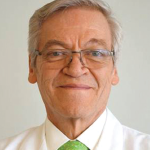Paul Sufka Named Social Media Editor for New ACR Twitter Account
 A clinical rheumatologist with HealthPartners in St. Paul, Minn., Paul Sufka, MD, is conversant with social media: he’s been on Twitter for almost 10 years; has hosted an online rheumatology podcast; and blogs about physician self-care and using Twitter as a tool at medical meetings. He’s also served as a member of ACR’s Committee on Marketing and Communications for three years.
A clinical rheumatologist with HealthPartners in St. Paul, Minn., Paul Sufka, MD, is conversant with social media: he’s been on Twitter for almost 10 years; has hosted an online rheumatology podcast; and blogs about physician self-care and using Twitter as a tool at medical meetings. He’s also served as a member of ACR’s Committee on Marketing and Communications for three years.
Recently, seeking to boost the online profile and readership of ACR journals, Richard Bucala, MD, PhD, editor in chief of Arthritis & Rheumatology, and Daniel Solomon, MD, MPH, asked Dr. Sufka to become the first-ever social media editor for the new ACR Twitter account, @ACR_Journals.
Dr. Sufka is enthusiastic about his pioneering role. “The concept of having a physician as a social media editor for a medical journal is a fairly new idea,” he says. “Given the increasing importance of social media in the spread of online information, I thought it would be an exciting opportunity to be one of the first who might help shape how this position develops.”
With help from Drs. Bucala and Solomon, he picks key studies from Arthritis & Rheumatology, Arthritis Care & Research and the recently launched ACR Open Rheumatology and tweets highlights from each journal’s table of contents. “Composing things into a tweet has become natural for me over time,” he says. “And, whenever possible, I try to include an image that explains more than can be told in 280 characters.”
The account had more than 500 followers in the first week. It will allow Dr. Sufka and the journal editors to track which topics resonate with their primary audience of ACR members. Although Dr. Sufka doesn’t expect any of his topics to go viral [unless a controversial topic such as vaccines is tweeted], “We will get a sense of what people interact with and what they’re sharing,” he says.
New Editor in Chief for Clinical Rheumatology
 The Executive Committee of the International League of Associations for Rheumatology (ILAR) has appointed Carlos Pineda, MD, PhD, a medical sciences researcher affiliated with the Instituto Nacional de Rehabilitación in Mexico City, as the new editor in chief of Clinical Rheumatology. Dr. Pineda, who previously served as the ILAR chair from 2015 to 2016, will be editor in chief from 2019 to 2023, and has already established an agenda for his five-year editorial appointment.
The Executive Committee of the International League of Associations for Rheumatology (ILAR) has appointed Carlos Pineda, MD, PhD, a medical sciences researcher affiliated with the Instituto Nacional de Rehabilitación in Mexico City, as the new editor in chief of Clinical Rheumatology. Dr. Pineda, who previously served as the ILAR chair from 2015 to 2016, will be editor in chief from 2019 to 2023, and has already established an agenda for his five-year editorial appointment.
“The scientific level achieved by our journal during the last five years under the direction of Luis Espinoza, MD, Section of Rheumatology, Louisiana State University Health Sciences Center, New Orleans, is remarkable and lofty in height,” he says. “I intend to continue the laudable work done by my predecessor and colleague.”
As the official journal of ILAR, Clinical Rheumatology is in a unique position to publish developments in worldwide clinical and experimental research from its partner organizations—ACR, PANLAR, AFLAR, APLAR and EULAR. Dr. Pineda is retaining the current roster of associate editors, including Zhanguo Li, MD, PhD, Department of Rheumatology and Immunology, People’s Hospital, Beijing University, China; Cesar Ramos-Remus, MD, MSc, Unidad de Investigación en Enfermedades Crónico-Degenerativas, Guadalajara, Jalisco, Mexico; Tim L. Jansen, MD, PhD, Department of Rheumatology, VieCuri Medisch Centrum, Venlo, The Netherlands; and Luis Javier Jara Quezada, MD, Departamento de Reumatología, Laboratorio de Immunología y Endocrinología, Hospital de Especialidades La Raza, Instituto Mexicano del Seguro Social, Ciudad de México, Mexico; all of whom are distinguished rheumatologists and well-cited researchers. He has also promoted Adewale O. Adebajo, MD, PhD, faculty of medicine, dentistry and health, University of Sheffield, U.K. (who was formerly an associate editor) to the position of deputy editor.
To address what he has called “the notorious minority of female members of our editorial board,” Dr. Pineda is bringing in Karina D. Torralba, MD, Division of Rheumatology, Loma Linda University, Calif., as coordinator of educational projects and Lucía Silva-Fernández, MD, PhD, Complexo Hospitalario Universitario de A Coruña, Mexico, as statistical consultant for the journal. He says he will encourage inclusion of women scientists as authors, reviewers and editorial board members, especially those from Asia Pacific, Africa and the Middle East.
In the ensuing months, Dr. Pineda and his editorial board also plan to recognize the work of their select group of reviewers through Publons Peer Reviewer Recognition Initiative.
Organizing communications with associate editors and editorial board members with worldwide reach can be quite a challenge, Dr. Pineda says. “There is a 14-hour difference between Mexico City and Beijing, just to give an example,” he says. “Instead of making someone stay awake for a conference or video call, we prefer email as our primary communication.”
Dr. Pineda’s goals include improving the journal’s ratings and encouraging publication of innovative content online. He plans to use the journal’s ability to proliferate scientific knowledge to “foment a dialogue and establish solid scientific exchange chains among ILAR’s partner organizations.”
He has also outlined several strategies to help accomplish these goals. For example, he’ll boost topical collections as a means to propagate biomedical and clinical advances to target audiences, including students, residents, practicing rheumatologists and allied professionals. He has created a new section called Research Letters, which will feature 650-word summaries of preliminary study results and will include 10 references, tables and figures, as well as a discussion. “The purpose of these Letters,” he says, “is to present our readers advances and scoops on remarkably focused clinical research.” Another new section, Perspectives, provides a forum where authors can share clinical, methodological or ethical points of view on hot topics emerging in rheumatology, he says.
While chair of ILAR, Dr. Pineda focused on clinical needs of rheumatologists in developing countries, especially addressing solutions for treatment in countries with limited resources. As the new editor in chief of Clinical Rheumatology, he is dedicated to strengthening ILAR’s mission to promote greater recognition of the conditions that will foster musculoskeletal health in all countries, “especially underdeveloped nations.”

